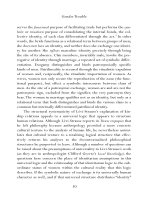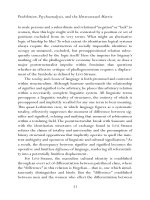GENDER TROUBLE 33
Bạn đang xem bản rút gọn của tài liệu. Xem và tải ngay bản đầy đủ của tài liệu tại đây (20.48 KB, 1 trang )
Gender Trouble
clearly impossible to recover the origins of these essays, to locate the
various moments that have enabled this text. The texts are assembled
to facilitate a political convergence of feminism, gay and lesbian perspectives on gender, and poststructuralist theory. Philosophy is the
predominant disciplinary mechanism that currently mobilizes this
author-subject, although it rarely if ever appears separated from other
discourses. This inquiry seeks to affirm those positions on the critical
boundaries of disciplinary life. The point is not to stay marginal, but to
participate in whatever network or marginal zones is spawned from
other disciplinary centers and that, together, constitute a multiple displacement of those authorities. The complexity of gender requires an
interdisciplinary and postdisciplinary set of discourses in order to resist
the domestication of gender studies or women studies within the academy and to radicalize the notion of feminist critique.
The writing of this text was made possible by a number of institutional and individual forms of support. The American Council of
Learned Societies provided a Recent Recipient of the Ph.D. Fellowship
for the fall of 1987, and the School of Social Science at the Institute for
Advanced Study in Princeton provided fellowship, housing, and
provocative argumentation during the 1987–1988 academic year. The
George Washington University Faculty Research Grant also supported
my research during the summers of 1987 and 1988. Joan W. Scott has
been an invaluable and incisive critic throughout various stages of this
manuscript. Her commitment to a critical rethinking of the presuppositional terms of feminist politics has challenged and inspired me. The
“Gender Seminar” assembled at the Institute for Advanced Study under
Joan Scott’s direction helped me to clarify and elaborate my views by
virtue of the significant and provocative divisions in our collective
thinking. Hence, I thank Lila Abu-Lughod, Yasmine Ergas, Donna
Haraway, Evelyn Fox Keller, Dorinne Kondo, Rayna Rapp, Carroll
Smith-Rosenberg, Louise Tilly. My students in the seminar “Gender,
Identity, and Desire,” offered at Wesleyan University and at Yale in 1985
and 1986, respectively, were indispensable for their willingness to
xxxii









